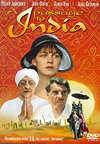A Passage To India
Sony Pictures Home Entertainment
Cast: Peggy Ashcroft, Victor Banerjee, Judy Davis, James Fox, Alec Guinness
Extras: Reflections of David Lean, Theatrical Trailers, Talent Files
Rating:
Amazing how age softens perspective. A fresh viewing of "Passage," courtesy of Columbia TriStar Home Video’s new DVD, reveals an eloquent adaptation of E.M. Forster’s complex novel about British colonialism in 1928 India and the cultural and sensual abysses that separate men and women, English and Indian, sensualist and ascetic.
At a lunch party given by British teacher Richard Fielding (James Fox), who does not share his countrymen’s disrespect for India, Adela meets Aziz for the first time while Mrs. Moore and Fielding converse about metaphysics with Professor Godbole (Alec Guinness, donning yet another disguise for Lean), a Brahmin mystic. Adela is fascinated by Aziz’s juggling of their two societies. In an effort to impress Adela and fit in as more of an Englishman, Aziz impulsively calls for an expedition to the mysterious Marabar caves outside town.
Adhering closely to the Forster novel, Lean’s screenplay adaptation finds greater interest (and rightly so) in the circumstances that led to the incident as well as the aftermath. Davis’ Adela is repressed and cloistered comfortably within British society. Both Aziz and India arouses her, awakening sensual feelings capable of enlightenment…or destruction. Lean visualizes this conflict with a scene not in the book. When Adela goes bicycling outside the city (Chapter 8), she comes across the ruins of an ancient temple. Almost voyeur-like, she spies the numerous statues of couples having sex. Adela herself almost reaches a fever pitch when wild monkeys literally expel her from their feral sanctuary. The lack of respect that Adela showed in her judgment is a direct contrast to Mrs. Moore’s deference when she enters the mosque and meets Aziz. Yet Lean gave us the conflict in purely visual terms, no less grand than the match-to-sunrise jump cut in "Lawrence" or the endless icy tundras of "Zhivago. "Passage" proved a worthy valediction to Lean’s career. Between directing, scripting and editing the film, we see Lean in complete command in his storytelling faculties. Even the final scene, straight out of the book, works better in the film than on the page.
The <$DS,Dolby Surround> audio plays adequately; to be expected as the sound mix is not particularly flashy to begin with. Maurice Jarre’s score, which weaves Hindu music with Cole Porter-esque rhythm, never overpowers the dialogue or sound effects. Surround channel activity is relegated primarily to music fill. French and Spanish mono tracks are also available on the disc.
The main perk of the special features is a section entitled "Reflections on David Lean." While the title implies a testimonial to David by his peers, it’s actually an eight-minute collection of soundbites, shot on video, from David about the making of "Passage" and some thoughts about such collaborators as William Holden and Alec Guinness. There’s no identification of the source or circumstances of the observations, but he’s never less than fascinating when talking about the difficulties of shooting in India or how Forster wouldn’t let grant the movie rights because he "distrusted filmmaking."
Check out "A Passage to India." A thoughtful, quiet gem awaits you.







